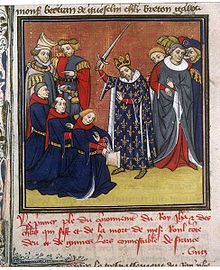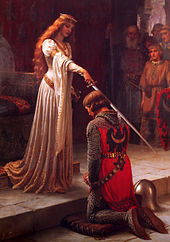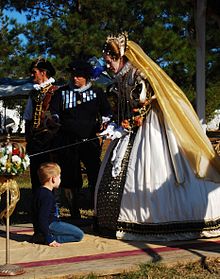- Accolade
-
For other uses, see Accolade (disambiguation).
In the Middle Ages, the accolade (also known as dubbing or adoubement) was the central act in the rite-of-passage ceremonies conferring knighthood.[1][2][3][4][5][6][7]
Contents
Ceremony
The accolade is a ceremony to confer knighthood that may take many forms including, for example, the tapping of the flat side of a sword on the shoulders of a candidate[1][4][8] or an embrace about the neck.[4]
In the first example, the "knight-elect" kneels in front of the monarch on a knighting-stool when the ceremony is performed.[1] First, the monarch lays the flat side of the sword's blade onto the accolade's right shoulder.[1] They then raise the sword gently just up over the apprentice's head and places it then on his left shoulder.[1][4] The new knight then stands up after being promoted, and the King or Queen presents him with the insignia of his new order.[1]
 King John II of France in a ceremony of "adoubement", early 15th century miniature
King John II of France in a ceremony of "adoubement", early 15th century miniature
There is some disagreement amongst historians on the actual ceremony and in what time period certain methods could have been used. It could have been an embrace or a slight blow on the neck or cheek. In knighting his son Henry, with the ceremony of the accolade, history records that William the Conqueror used the blow.[4]
The blow, or colée, when first utilized was given with a naked fist. It was a forceful box on the ear or neck that one would remember. This was later substituted for by a gentle stroke with the flat part of the sword against the side of the neck. This then developed into the custom of tapping on either the right or left shoulder or both, which is still the tradition in Great Britain today.[4]
An early Germanic coming-of-age ceremony, of presenting a youth with a weapon that was buckled on him, was elaborated in the 10th and 11th centuries as a sign that the minor had come of age. Initially this was a simple rite often performed on the battlefield, where writers of Romance enjoyed placing it. A panel in the Bayeux Tapestry shows the knighting of Harold by William of Normandy, but the specific gesture is not clearly represented. Another military knight (commander of an army), sufficiently impressed by a warrior's loyalty, would strike a fighting soldier on the head or his back and shoulder with his hand and announce that he was now an official knight.[1] Some words that might be spoken at that moment were Advances Chevalier au nom de Dieu.[1]
The increasingly impressive ceremonies surrounding adoubement figured largely in the Romance literature, both in French and in Middle English, particularly those set in the Trojan War or around the legendary personage of Alexander the Great.[9]
In the Netherlands the knights in the exclusive Military Order of William (the Dutch "Victoria Cross") are striken on both shoulders with the palm of the hand, first by the Dutch monarch (if present) then by the other knights. The new knight does not kneel.[10]
Promotion steps
The process of becoming a knight generally included these stages:
- Page — A child started training at about the age of seven or eight, learning obedience, manners, and other skills.[5]
- Squire — At 12 to 14 the young man would observe and help other knights (comparable to an apprenticeship). He would learn fighting techniques by handing them their arrows and watching how they fought. He would also go hunting with other knights to learn how to use weapons.[5] He would go into recruit training to learn how to become a military fighter. At age 21, if worthy, he was bestowed the accolade of knighthood.[5]
- Knight — A special kind of trained soldier, often cavalry, serving a lord (nobleman or royalty). Knights had particular status in feudal society.[5]
Other meanings
Accolade was first used in 1611 and is French, from the Occitan acolada. This, in turn, came from the Latin ad ("to") + collum ("neck") and in Occitan originally meant "embrace".[8][11]
Accolade is akin to "dubbing" or "to dub" [1] since the tap on the shoulder with the sword is accepted to be the point at which the title is awarded.[8][12]
Clergy receiving a knighthood are not dubbed. The use of a sword in this kind of a ceremony is believed to be inappropriate.[1]
From about 1852, the meaning of "accolade" was extended to mean "praise" or "award" or "honour."[8][11]
See also
References
 This article incorporates text from a publication now in the public domain: Chisholm, Hugh, ed (1911). Encyclopædia Britannica (11th ed.). Cambridge University Press.
This article incorporates text from a publication now in the public domain: Chisholm, Hugh, ed (1911). Encyclopædia Britannica (11th ed.). Cambridge University Press.- Bloch, Marc: Feudal Society, tr. Manyon London:Rutledge, Keagn Paul (1965)
- Boulton, D'Arcy Jonathan Dacre. The Knights of the Crown: The Monarchical Orders of Knighthood in Later Medieval Europe, 1325-1520. 2d revised ed. Woodbridge, Suffolk: Boydell Press, 2000.
- Keen, Maurice; Chivalry, Yale University Press 1984, ISBN 0-300-03150-5
- Robards, Brooks; The Medieval Knight at War, UK: Tiger Books, 1997, ISBN 1-85501-919-1
Notes
- ^ a b c d e f g h i j "Royal insights". http://www.royalinsight.gov.uk/OutPut/Page4877.asp. Retrieved 2008-05-18.
- ^ "Knighthood, Chivalry & Tournament -Glossary of Terms (letter "A")". http://www.chronique.com/Library/Glossaries/glossary-KCT/gloss_a.htm. Retrieved 2008-05-18.
- ^ "Knighthood, Chivalry & Tournament -Glossary of Terms (letter "K")". http://www.chronique.com/Library/Glossaries/glossary-KCT/gloss_k.htm#knighthood. Retrieved 2008-05-18.
- ^ a b c d e f "Article from the 1911 Encyclopedia Britannica". http://historymedren.about.com/od/aentries/a/11_accolade.htm. Retrieved 2008-05-18.
- ^ a b c d e "Castle Life - The International History Project". http://history-world.org/castle_life.htm. Retrieved 2008-05-18.
- ^ "Knighthood and the Knightly Orders". http://www.regalis.com/malta/knights.htm. Retrieved 2008-05-19.
- ^ "Page, Squire, and Knight". http://www.mainlesson.com/display.php?author=tappan&book=bold&story=page. Retrieved 2008-05-19.
- ^ a b c d "Dictionary online reference". http://dictionary.reference.com/browse/accolade. Retrieved 2008-05-18.
- ^ Ackerman, Robert W. "The Knighting Ceremonies in the Middle English Romances." Speculum 19(3): July 1944, 285-313, compared the abbreviated historical accounts with the sometimes fancifully elaborated episodes in the romances.
- ^ Moed en Trouw door J. Van Zelm van Eldik
- ^ a b "Accolade etymology". http://forum.seslisozluk.com/archive/index.php/t-246.html. Retrieved 2008-05-19.
- ^ Dobson, Richard Barrie (2000). Encyclopedia of the Middle Ages. ISBN 9781579582821. http://books.google.com/?id=qtgotOF0MKQC&pg=PA451&lpg=PA451&dq=%22middle+ages%22+accolade+ceremony+conferring+knighthood. Retrieved 2008-05-19.
Categories:- Feudalism
- Knights
- Warfare of the Middle Ages
Wikimedia Foundation. 2010.


